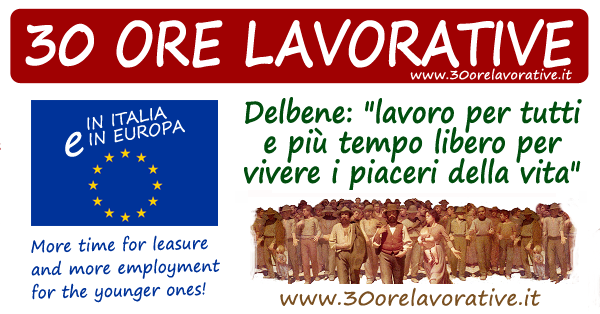and more employment for the younger ones!"
,
di Daniele Delbene
 |

A society that is changing faster and faster would need new social models to govern and accompany its processes. On the contrary, there is a widespread lack of vision of the future. As a consequence, the main commitment and efforts of the political and social forces are only focused on the governance of the actuality of events. Thus, answers are parceled out to big issues that should be addressed within much wider and deeper horizons. Lost the ability to imagine and "dream" a better future, everything is focused on temporary "buffer solutions".
Instead of dismissing many of the proposals on the agenda of the new political forces as “electoral-populist” initiatives, one should rather wonder about their underlying reasons. We would realize that many of these are real and mature from the inability of the old social models to give the necessary answers to the new needs of a constantly evolving society.
By observing society with a conscious eye, one would realize that we are not facing an incurable diseases and therefore do not need palliative responses:
- the “income of citizenship” (to
compensate for the decrease in jobs due to new
technologies, automation and artificial intelligence);
- closure of shopping malls on festive days (to compensate
for the lack of time for family and leasure);
-
subsidies and facilities to assist the children and the
elderly (due to lack of the time to dedicate to them).
A deep awareness that looks to the future would grasp the new needs as the opportunity to build a better world. The great general systemic models should therefore be rethought, aiming at a goal of ever deeper social justice. The necessary redistribution of wealth, an essential foundation for the true freedom of man, cannot avoid facing the great question of work. Work that today is becoming a means of slavery instead of an instrument of freedom. Competition for the workplace, precariousness, the dynamism of schedules and forms of work are monopolyzing all the physical and mental resources.
There are no more certainties and fewer and fewer time to enjoy the pleasures of life.
The other side of the coin is a society that offers much more under other points of view, to which we have become accustomed and to which we would not give up.
- How to reconcile the tendency
to a growing reduction of jobs with the need for a
universal redistribution of wealth?
- How to reconcile
the pleasure and the opportunity to go shopping 24/7 with
the need of time to devote to personal life?
- How to
guarantee the right attention to our children and our
beloved ones who are in need assistance with a dynamic
work commitment that often covers the entire day?
The answer is not the “income of citizenship”, which creates competition between income from work and subsidy and tends to degrade the own dignity of man, or the closure of shopping centers that the same stressed and exhausted workers would innerly like to be open at all hours, or deduction for the costs of baby-sitters and assistants to our loved ones.
A forward-looking and organic response can only be identified in the reduction of working hours that would enable more people to work less time.
Obviously, the reduction of working hours should not lead to a reduction in wages, which would neutralize its effects.
The general reduction of working time must be part of a much broader plan, that goes beyond the current national borders and that is based on the construction of new and future democratic and supranational organizations.
While looking at the construction of a new future model, the reduction of working hours can be established immediately by finding technical solutions to support it.
This is an invitation to
political and trade union organizations, to the world of
culture and to all those men who aim to "look to the
future", recognizing themselves in the values of
reformist and democratic socialism, so that they may
become promoters (in our country and beyond) of the “30
working hours”
Daniele Delbene (18-09-2018)